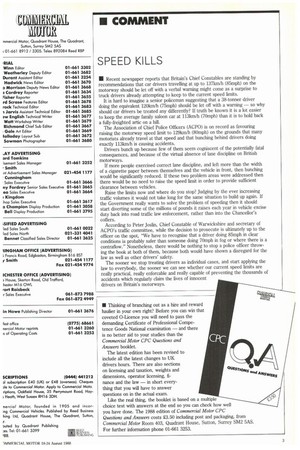SPEED KILLS
Page 3

If you've noticed an error in this article please click here to report it so we can fix it.
• Recent newspaper reports that Britain's Chief Constables are standing by recommendations that car drivers travelling at up to 1371an/h (85mph) on the motorway should be let off with a verbal warning might come as a surprise to truck drivers already attempting to keep to the current speed limits.
It is hard to imagine a senior policeman suggesting that a 38-tonner driver doing the equivalent 120km/h (75mph) should be let off with a warning — so why should car drivers be treated any differently? If truth be known it is a lot easier to keep the average family saloon car at 113km/h (70mph) than it is to hold back a fully-freighted artic on a hill.
The Association of Chief Police Officers (ACPO) is on record as favouring raising the motorway speed limit to 129km/h (80Triph) on the grounds that many motorists already travel at that speed and that bunching behind drivers doing exactly 1131unfh is causing accidents.
Drivers bunch up because few of them seem cogniscent of the potentially fatal consequences, and because of the virtual absence of lane discipline on British motorways.
If more people exercised correct lane discipline, and left more than the width of a cigarette paper between themselves and the vehicle in front, then bunching would be significantly reduced. If these two problem areas were addressed then there would be no need to raise the speed limit in order to provide sufficient clearance between vehicles.
Raise the limits now and where do you stop? Judging by the ever increasing traffic volumes it would not take long for the same situation to build up again. If the Government really wants to solve the problem of speeding then it should start diverting some of the millions of pounds it raises each year in vehicle excise duty back into road traffic law enforcement, rather than into the Chancellor's coffers.
According to Peter Joslin, Chief Constable of Warwickshire and secretary of ACPO's traffic committee, while the decision to prosecute is ultimately up to the officer on the spot, "We have to recognise that a driver doing 85mph in clear conditions is probably safer than someone doing 70mph in fog or where there is a contraflow." Nonetheless, there would be nothing to stop a police officer throwing the book at both of them, because both would have shown a disregard for the law as well as other drivers' safety.
The sooner we stop treating drivers as individual cases, and start applying the law to everybody, the sooner we can see whether our current speed limits are really practical, really enforcable and really capable of preventing the thousands of accidents which regularly claim the lives of innocent drivers on Britain's motorways.










































